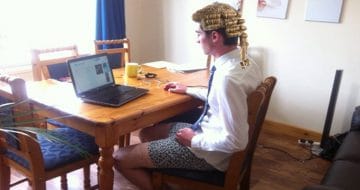Respondents to Bar Council survey also call on chambers to ditch rejection by silence

The majority of pupil barristers found the application process to secure pupillage “challenging” and said the experience could be improved by getting better feedback.
Eighty-eight percent of respondents to the Bar Council’s annual survey of pupils described the process as quite or very challenging, and nearly three-quarters (73%) identified better or clearer feedback as the factor to improving applicants’ chance of success.
Just over half (53%) of pupils said the process could be improved by chambers actually responding to their applications, whilst 41% said it’d be access to advice from current barristers.
Some 173 of all 411 practising pupils responded to the Bar Council survey, conducted in February.
A number of respondents also gave comments about aspects of their training they had found particularly challenging. Again, a lack of feedback in their pupillage is said to have hampered the learning experience. Another factor cited was remote working, which they attributed to the inability to socialise with other members of chambers and limited professional networking opportunities.
These findings are from the Bar Council’s second annual survey of pupils. The first was undertaken last year and focused specifically on the impact of Covid-19 on pupillage. The majority (82%) of pupils said the biggest challenge they faced during lockdown was the lack of networking opportunities. “It seems likely that this theme will continue as widespread remote working remains the norm,” this year’s report said.
This isn’t the first time concerns have been raised about the lack of feedback given during the highly competitive pupillage process.
Last year aspiring barristers Noah Gifford and Kieran Alker urged the bar to do better when it comes to providing applicants with feedback. Gifford highlighted the common practice among some chambers of rejecting pupils by silence, describing it as “shameful” and “insulting”, and suggesting they send out rejection emails or that the regulator impose a requirement to inform candidates of the outcome of their applications. The Legal Services Board appeared to side with pupillage seekers when it warned the Bar Standards Board (BSB) that such a policy risks undermining the profession.
Figures released this year by the BSB show that pupillage numbers have rebounded post-lockdown; there were 511 barristers-in-training at the end of 2021, compared with a record low 354 in 2020. But the numbers are still low by historical standards. In the 1990s, chambers took on about 800 pupils a year. It’s also worth noting that several thousands of bar hopefuls are competing for these select few pupillage spots each year.


